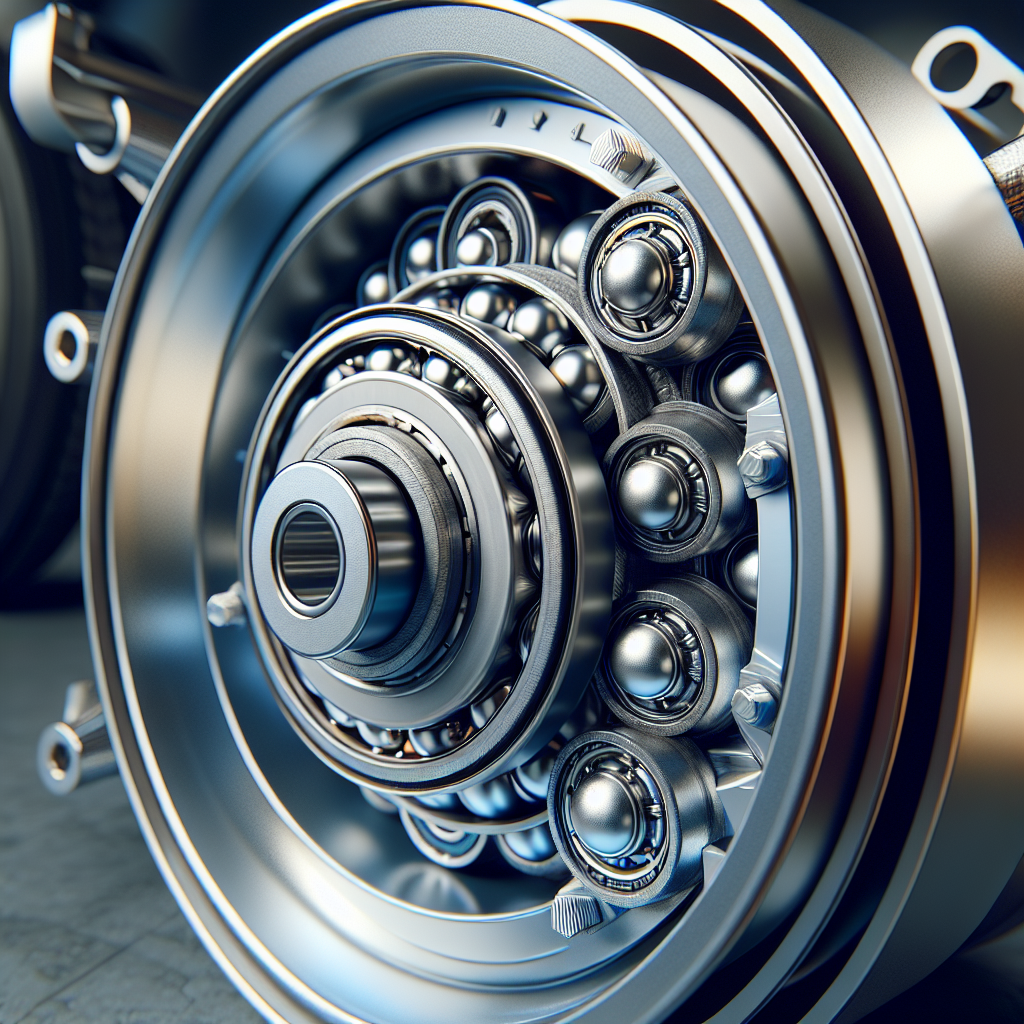Trailer bearings play a crucial role in ensuring the smooth operation of any trailer. They are designed to facilitate the rotation of the wheels, allowing them to spin freely while supporting the weight of the trailer and its cargo. This functionality is vital for maintaining stability and safety during towing.
Essentially, trailer bearings reduce friction between the axle and the wheel hub, which is where the tires are mounted. This reduction in friction allows for easier movement and less wear on components, prolonging the life of the trailer. When it comes to the mechanics of how trailer bearings work, here are some key points to consider:
- Load Distribution: Trailer bearings evenly distribute the weight of the trailer, ensuring that pressure is not concentrated on any single point, which can lead to premature wear.
- Heat Dissipation: As the trailer travels, friction generates heat. Bearings are designed to dissipate this heat, minimizing the risk of overheating and failure.
- Types of Bearings: There are various types of trailer bearings, including roller and ball bearings, each designed for specific applications and load capacities.
Understanding how trailer bearings function is essential for any trailer owner, as it highlights the importance of regular maintenance and monitoring. Integrating a monitoring system can help track the condition of bearings, reducing the risk of catastrophic failures caused by neglect.
Tow with peace of mind, knowing that trailerwatchdog is standing guard.
Different Types of Trailer Bearings Explained
When it comes to trailer bearings, various types are available, each designed to meet specific needs and performance standards. Understanding these different types can help you choose the right bearing for your trailer application, ensuring optimal performance and safety on the road.
Here are the main types of trailer bearings:
- Ball Bearings: These are among the most common types of trailer bearings. They consist of small balls that sit between two races, allowing for smooth rotation. Ball bearings are ideal for light to moderate loads and are often used in smaller trailers.
- Roller Bearings: Roller bearings use cylindrical rollers instead of balls, providing a larger contact area. This design allows them to handle heavier loads and is typically used in larger or more heavily loaded trailers.
- Needle Bearings: A subtype of roller bearings, needle bearings are designed with long, thin rollers. They are particularly effective at handling radial loads while taking up minimal space. Needle bearings are often found in applications where there are space constraints.
- Self-Aligning Bearings: These bearings can adjust their position to accommodate misalignment, making them suitable for trailers that may experience uneven loading or movement. They help in maintaining proper wheel alignment, enhancing tire life and trailer handling.
Each type of bearing has its own advantages and disadvantages, depending on factors such as load capacity, speed, and maintenance requirements. Selecting the right type of bearing for your trailer not only improves performance but also increases safety on the road.
How to Properly Maintain Trailer Bearings

Proper maintenance of trailer bearings is crucial for ensuring their longevity and optimal performance. Neglecting this essential component can lead to catastrophic failures, which may result in costly repairs or accidents. Here are some key steps to effectively maintain your trailer bearings:
- Regular Inspections: Inspect your trailer bearings at least once a year or every time you perform significant maintenance. Look for signs of wear, rust, or any unusual noise while the trailer is in motion.
- Cleaning: Remove old grease and debris from the bearings during inspections. Use a suitable solvent to clean the bearing surfaces thoroughly. This step helps prevent contamination and ensures smooth operation.
- Greasing: After cleaning, apply the appropriate type of grease to the bearings. Ensure the grease is compatible with the bearing material and can withstand the operating conditions. Over-greasing can be just as harmful as under-greasing, so use the correct amount.
- Check the Seals: Inspect the seals around the bearings for any signs of damage or wear. Seals protect the bearings from dirt and moisture, which can lead to premature failure. Replace any damaged seals promptly.
- Monitor Temperature: Keeping an eye on the temperature of the bearings is vital. Excessive heat can indicate a problem, such as insufficient lubrication or misalignment. Consider using a monitoring system to track axle temperature and ensure safe operation.
By implementing these maintenance practices, you can significantly enhance the lifespan and reliability of your trailer bearings, ensuring safer travels.
Signs of Worn or Damaged Trailer Bearings

Recognizing the signs of worn or damaged trailer bearings is essential for maintaining the safety and performance of your trailer. Ignoring these warning signs can lead to serious issues, including complete bearing failure. Here are some key indicators to watch out for:
- Unusual Noises: If you hear grinding, squealing, or rumbling noises while towing, it may indicate that the bearings are worn out or damaged. This noise often becomes more pronounced when turning or during acceleration.
- Excessive Heat: Overheating is a common sign of bearing failure. If you notice that the wheel hubs are hotter than usual, it could be due to insufficient lubrication or a misalignment issue.
- Vibration: Excessive vibration while towing can signal a problem with the bearings. If the trailer shakes or vibrates more than usual, it’s crucial to investigate immediately to prevent further damage.
- Visual Inspection: When performing regular checks, look for signs of grease leaking from the wheel hubs. If the grease is missing or contaminated with dirt and debris, it indicates that the bearings may be compromised.
- Play in the Wheel: If you can rock the wheel back and forth or up and down, this may suggest that the bearings are worn and need immediate attention.
Being proactive in identifying these signs can help you address potential issues before they escalate into major failures, ensuring safer towing experiences.
The Importance of Monitoring Trailer Bearings

Monitoring your trailer bearings is not just a preventive measure; it is a critical aspect of ensuring the longevity and safety of your trailer. Regular observation and maintenance can significantly reduce the risk of catastrophic failures, making it essential for any trailer owner. Here’s why monitoring trailer bearings is so important:
- Early Detection of Issues: Implementing a monitoring system allows for early detection of any anomalies, such as overheating or unusual noise. By catching these issues early, you minimize the risk of a complete failure that could lead to costly repairs or accidents.
- Increased Safety: Properly functioning bearings contribute significantly to overall trailer safety. Monitoring helps ensure that your bearings are in optimal condition, thus improving the stability and control of your trailer while on the road.
- Cost-Effectiveness: Regular monitoring can save you money in the long run. Timely maintenance and repairs can prevent more extensive damage to the trailer and its components, reducing downtime and repair costs.
- Enhanced Performance: Well-maintained bearings contribute to smoother towing experiences. Monitoring ensures that your trailer operates at its best, allowing for better fuel efficiency and overall performance.
- Peace of Mind: Knowing that your trailer bearings are regularly monitored gives you the confidence to tow without worry. This peace of mind is invaluable, especially during long journeys.
By investing time in monitoring your trailer bearings, you not only extend their lifespan but also ensure a safer, more efficient towing experience.
Impact of Trailer Bearings on Overall Performance

The performance of a trailer is intricately linked to the condition and functioning of its bearings. When it comes to towing, trailer bearings play a pivotal role in ensuring that the trailer operates smoothly and efficiently. Here’s how they impact overall performance:
- Load Distribution: Trailer bearings help distribute the load evenly across the axle, which is crucial for maintaining stability. Properly functioning bearings ensure that weight is balanced, preventing uneven wear and tear on tires and other components.
- Fuel Efficiency: When bearings are in good condition, they reduce friction and allow the wheels to turn freely. This leads to less resistance while towing, ultimately enhancing fuel efficiency and saving you money on gas.
- Towing Stability: The integrity of trailer bearings directly affects towing stability. Worn or damaged bearings can lead to swaying and instability, making it difficult to control the trailer, especially during turns or in windy conditions.
- Braking Performance: Effective bearings contribute to optimal braking performance. If bearings are compromised, the braking system may not function as intended, increasing the likelihood of accidents.
- Longevity of Components: Well-maintained trailer bearings ensure that other components, such as tires and brakes, experience less wear and tear. This not only prolongs their lifespan but also enhances the overall reliability of the trailer.
In summary, the impact of trailer bearings on overall performance cannot be overstated. They are essential for safe and efficient towing. Tow with peace of mind, knowing that trailerwatchdog is standing guard.








